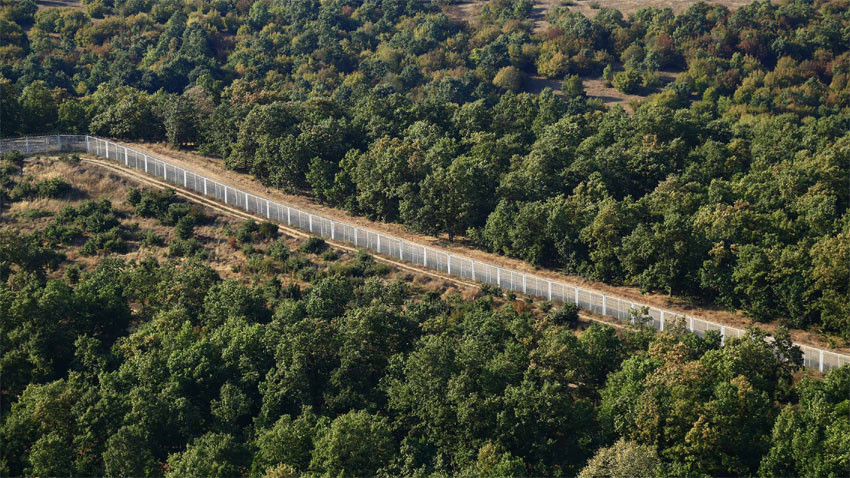
At the end of 2018 Bulgaria’s Ministry of Interior published data on migration in this country. The statistics is a reason for different comments, because some figures are alarming and other are encouraging.
A total of 1,807 illegal migrants entered Bulgaria in 2018. The number of migrants entering Bulgaria last year fell significantly, because in 2017 a total of 2,989 migrants entered this country and one year earlier in 2016 their number amounted to 18,844. Bulgaria has been subject to illegal migration pressure in the recent years, but the number of illegal foreign nationals entering this country dwindled significantly.
The migration pressure from Bulgaria to the EU also continues. In 2017 the number of detained people (743) was nearly twice higher than the number of detained migrants leaving this country (445). However, in 2018 a total of 648 migrants were arrested after their entered Bulgaria and 632 people were detained in their attempt to leave Bulgaria. In other words, the number of migrants who resided illegally in this country remained almost unchanged last year.
According to some observers, the expensive fence along the Bulgaria-Turkey border does not stop migration pressure. They contend that most of the illegal entries were made through the green border which had to be protected by the border fence. 405 out of all 648 illegal migrants were detained when they attempted to cross the green border after climbing over the border fence. Only 243 people tried to enter Bulgaria through border checkpoints. This note is quite reasonable, but we should also ask why this ratio was not the same years ago when the border fence was not fully constructed and when migration pressure was huge.
The 2018 statistics of the Bulgarian Ministry of Interior about migration also shows that the structure of migration pressure remains almost unchanged and most migrants are coming from countries without any military conflicts. Last year 47.5% of all detained migrants came from Afghanistan, 26.6% were Iraqi citizens and only 10.2% came from Syria.
The quantitative changes in the migration statistics result in other types of problems as well. Many illegal migrants left the refugee centers where they were accommodated after their entry in Bulgaria. A total of 84 people escaped from migrant accommodation centers in the third week of December only, whereas 59 people received refugee statute in that week. The total capacity of the accommodation center with the State Agency for Refugees amounts to 5,190. At the end of December 2018 only 523 people lived in these centers. The capacity of the closed-type centers of the Bulgarian Ministry of Interior amounted to 700, while only 186 people (26% of the total capacity) were accommodated in these centers at the end of December last year. In other words, the Bulgarian migrant authorities will soon have to decide whether to maintain the huge capacity of the migrant centers which were opened to deal with the migrant flow from the Middle East towards Western Europe. This decision will be made within the context of the new migration policy of the EU. During the debates on this policy Bulgaria backed the thesis that the EU must ensure strong control of its external borders and that Western Europe should not return illegal migrants to the countries in which they were first registered and that the efforts of the European Union must be focused on addressing the reasons for migration in the migrants’ home countries.
English version: Kostadin Atanasov
Photo: BGNESA Christmas tree with Bulgarian decorations has been placed in a central location at the Griffin Museum of Science and Industry in Chicago. For the fifth consecutive year, Bulgarians living in Chicago crafted the lavish decoration of the Bulgarian..
The usurpation of cultural heritage is one of the many inevitable consequences of any military conflict, both historically and today. Until the end of the war in Ukraine, it is impossible to adequately analyse the extent of the damage caused to the..
Athens plans to modernise the Greek army by 2030 Greece's Defence Minister Nikos Dendias presented the plan for changes in the army to the parties in parliament. The reforms will cover all three branches of the military. By 2030, 33 units..
An innovation for the treatment of diabetic foot ulcer using the patient's own tissue and artificial intelligence has been implemented at the University..
Over 3.5 million Ukrainians have arrived in or passed through Bulgaria since the beginning of the war. Nearly 200,000 people have found temporary..
At the Bulgarian Embassy in London, Prof. Bettany Hughes presented excerpts from the new BBC series - Wonders of Bulgaria. Prof. Bettany..

+359 2 9336 661
